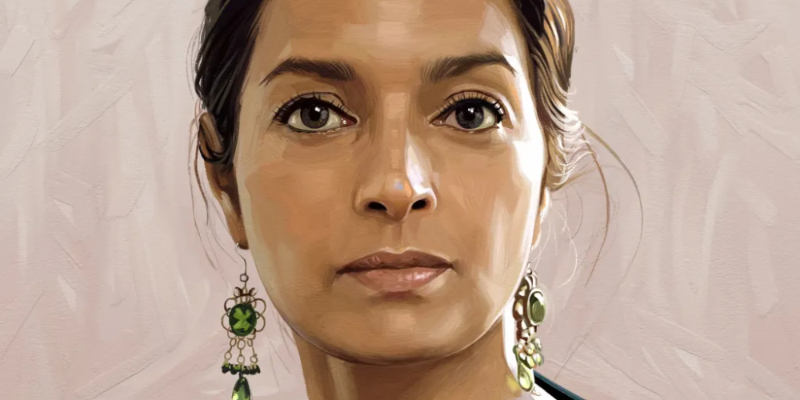Jhumpa Lahiri on the Freedom of Writing
This Week on the Talk Easy Podcast with Sam Fragoso
Illustration by Krishna Bala Shenoi.
Talk Easy with Sam Fragoso is a weekly series of intimate conversations with artists, authors, and politicians. It’s a podcast where people sound like people. New episodes air every Sunday, distributed by Pushkin Industries.
*
To celebrate the release of her new story collection Roman Stories, we’re flashing back to when Pulitzer Prize-winning novelist Jhumpa Lahiri joined us in 2021. In vivid, writerly detail Lahiri describes being raised in a family “spread out in various places” , her late mother’s recurring presence in her writing, the comfort (and pain) of being an observer, and the vibrancy she found in Rome, which inspired her novel Whereabouts. On the back-half of our talk, Jhumpa reflects on the metamorphosis that occurred in her mother’s final days, how her familial ties (from Calcutta to Rhode Island) informed her early stories, and, finally, an exhortation on why she writes.
Subscribe and download the episode, wherever you get your podcasts!
From the episode:
Sam Fragoso: I get the sense that the driving force of so much of your writing is a desire to feel untethered.
Jhumpa Lahiri: That’s the ideal state for the writer. It’s to be able to write from purely one’s own perspective, and not feel that one needs to tell other people’s stories. Maybe one wants to tell other people’s stories, but how much of it is a want, and how much of it is a sense of obligation? Even if the obligation is coming from within yourself.
To come back to this earlier question about my parents at the center of four of my books, I think it is critical to move to the point where I don’t feel that I have to speak for other people. Part of what drove me to write those early stories was that impulse that I had, as a child as well, to be able to speak for my parents— to defend them, to protect them, to explain them in a world in which they weren’t being completely understood or respected or heard. I had access to both realities, so I was constantly going back and forth, and understanding, and reading; reading the ways they were being read. I was both their child and their protector. When I started to write, it was the first time I felt that I had an instrument, a voice, a perception, a way of protecting them and explaining them, through my stories largely about them and about their experiences.
SF: But it generated a kind of expectation, that obligation you’re talking about.
JL: Not from them particularly, but I think once you begin to write about, say—Bengali immigrants—then there’s that, “Oh, aren’t you going to write more stories about that?” That is what happened. I think that can become problematic because one writes to be free. One writes to feel free. We’re actually not free, but writing is a form of freedom. It’s a way to feel free.
SF: You wrote a beautiful description of why you write in your book In Other Words. Would you be open to reading some of that?
JL:
Why do I write? To investigate the mystery of existence. To tolerate myself. To get closer to everything that is outside of me.
Article continues after advertisementIf I want to understand what moves me, what confuses me, what pains me—everything that makes me react, in short—I have to put it into words. Writing is my only way of absorbing and organizing life. Otherwise it would terrify me, it would upset me too much.
What passes without being put into words, without being transformed and, in a certain sense, purified by the crucible of writing, has no meaning for me. Only words that endure seem real. They have a power, a value superior to us.
Given that I try to decipher everything through writing, maybe writing in Italian is simply my way of learning the language in a more profound, more stimulating way.
Ever since I was a child, I’ve belonged only to my words. I don’t have a country, a specific culture. If I didn’t write, if I didn’t work with words, I wouldn’t feel that I’m present on the earth.
What does a word mean? And a life? In the end, it seems to me, the same thing. Just as a word can have many dimensions, many nuances, great complexity, so, too, can a person, a life. Language is the mirror, the principal metaphor. Because ultimately the meaning of a word, like that of a person, is boundless, ineffable.
Article continues after advertisement
__________________
Jhumpa Lahiri, a bilingual writer and translator, is the Millicent C. McIntosh Professor of English and Director of Creative Writing at Barnard College, Columbia University. She received the Pulitzer Prize in 2000 for Interpreter of Maladies and is also the author of The Namesake, Unaccustomed Earth, and The Lowland. Since 2015, Lahiri has been writing fiction, essays, and poetry in Italian: In Altre Parole (In Other Words), Il Vestito dei libri (The Clothing of Books), Dove mi trovo (self-translated as Whereabouts), Il quaderno di Nerina, and Racconti romani. She received the National Humanities Medal from President Barack Obama in 2014, and in 2019 was named Commendatore of the Italian Republic by President Sergio Mattarella. Her most recent non-fiction book in English, Translating Myself and Others, was a finalist for the PEN/Diamonstein-Spielvogel Award for the Art of the Essay.
Sam Fragoso is the host of Talk Easy with Sam Fragoso, a weekly series of conversations with artists, activists, and politicians. His writing has appeared in The Atlantic, Vanity Fair, and NPR. After conducting seminal interviews with icons like Spike Lee, Werner Herzog, and Noam Chomsky, he independently founded Talk Easy in 2016.




















